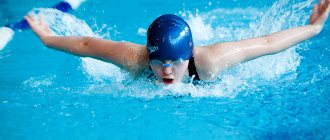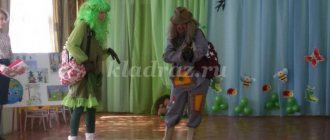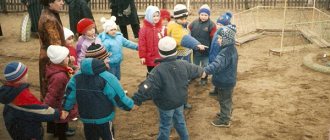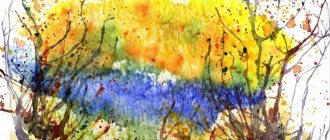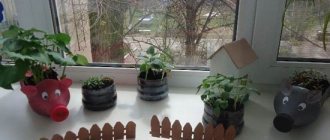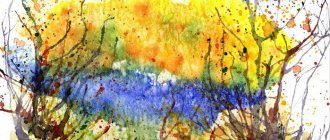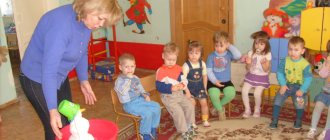Summer sports festival “Visiting Vodyanoy”
author: Karateeva Larisa Vladimirovna
Physical education instructor MBDOU Child Development Center - kindergarten No. 22 “Kleverok”
Summer sports festival “Visiting Vodyanoy”
Summer sports festival
"Visiting Vodyanoy."
Goals:
Create a joyful mood in children.
Tasks:
- Show the enormous importance of water for living organisms;
- Encourage children to respect nature;
- Cultivate a friendly attitude towards each other;
- Teach mutual assistance and mutual assistance.
Equipment:
racks -2, buckets of water -2, empty buckets -2, sponges -2, tables -2, plastic cups with water -2, basins with water -2, small toys according to the number of children, trays -2, transparent jars -2 , audio recordings of music for competitions.
Progress of the holiday.
Leading:
Hello guys! It's no secret that every child loves summer. Because in summer you can spend a lot of time outside, go to the beach and swim! Do you guys like summer? (Yes...) Do you like to swim? (Yes...) Today we will hold a gaming competition program for you. And what our game will be dedicated to, you will find out from the riddle.
Mystery:
If our hands are stained with polish, If there are blots on our nose, Who then is our first friend, Who will remove the dirt from our face and hands? Without which mother cannot cook or wash, Without which, we will say frankly, Should a person die? For rain to fall from the sky , So that ears of bread grow, So that ships sail - We cannot live without ... water!!!
Leading:
That’s right, water is life.
Today you and I will play and be naughty. All our competitions will be dedicated to “Water Fun”. And here’s the agreement - no one is offended by anyone! Agreed?! To warm up, let's start with riddles:
Guess the “water” riddles:
- He is without arms, he is without legs, he was able to break through the earth, He gives us ice-cold water in the summer, in the very heat. (Spring.)
- The width is wide, the depth is deep, Day and night it beats on the shore. The water from it is not drunk, Because it is not tasty - It is both bitter and salty. (Sea.)
- I run to my mother river and cannot remain silent. I am her own son, And I was born in the spring. (Creek.)
- Not water, not land - You can’t sail away on a boat and you can’t walk with your feet. (Swamp.)
- In the middle of the field lies a mirror: The glass is blue, the frame is green. (Pond or lake.)
- The ribbon on the branch trembles a little in the open space, The narrow tip is in the spring, And the wide one is in the sea. (River.)
- Falling from a great height, he roars menacingly and, breaking against the stones, rises up foaming. (Waterfall)
Guys, our holiday will be dedicated to water and everything connected with it. The “Song of the Vodyanoy” sounds.
Water:
Hello little people!
Girls and boys, dear adults! I'm very glad to see you. You probably all recognize me, I live in a swamp, I eat fish and water. So who am I guys? (Children: Vodyanoy) (walks around the hall, gets acquainted - splashes from the sprayer). Presenter:
Hello Mr. Vodyanoy, thank you for deigning to come to the holiday this year.
Vodyanoy:
Yes, last year I was sick, I ate too much midges.
He lay in the moss, groaned and stroked his belly. And I see you’re having a holiday here? And what kind of beauties are these, little mermaids?! Come on, I'll take a look. Host:
So help us, determine who has longer hair.
Vodyanoy:
Okay, where are my scissors?!
Host:
What are you, what are you, the girls tried, raised, and you grab the scissors.
It would be better if you gave me some kind of prize. Vodyanoy:
Ah!
So I’ll immediately run to the swamp and bring a frog or a leech. Host:
We don’t need frogs, we’ll get a present for the one with the longest hair!
Vodyanoy:
I'm kidding, I'm kidding.
Here's a supply in case. Okay, I’ll share (takes out the prize). Vodyanoy:
Do you know what holiday it is today?
Then why don't you play? Host:
Now let’s play. Attention, we are holding “Water Relay Races”
1 Relay race “Water Carriers”.
Props: each team needs a bucket of water, a sponge and a glass. Task: Each participant puts the sponge in a bucket of water, runs to the finishing point, squeezes the water from the sponge into the glass, runs back to the team and passes the sponge to the next player. The team that gets the most water into the glass wins.
2 Relay race
“Underwater”
Props: a glass of water filled to the brim for each team. Task: The first player raises a glass of water above his head. He walks quickly to the finish point, goes around it and returns back, trying to spill as little water as possible. Passes the glass to the next player. The team with the most water left in the glass wins.
Leading:
To start the next competition, guess me this riddle:
His work is in the depths, at the very bottom. His work is in darkness and silence. But who is he, answer the question, Not an astronaut, but walking among the stars? (Diver. )
That's right, it's a diver. What does a diver do? (children's answers). Our next competition is called “Treasures from the Bottom of the Sea”
3 Relay race “Treasures from the bottom of the sea”
Props: A large basin with water, at the bottom of which there are various shiny small objects (beautiful buttons, beads, growing toys, shells, slimes, etc.); for each team, a spoon and a container for collecting “treasures”. Task: Using a spoon, collect as many objects as possible “from the bottom of the sea”. At the leader’s signal, the first players run up to a basin of water, take out one object with a spoon, put it in their cup, run back, pass the spoon to the next player, etc. The competition continues until the “treasures” run out. The team that collects the most items wins.
4 “Water Drawer” Relay
Players from each team take turns scooping water from a plate standing at the turning mark, running to the team and pouring the water into the jar. The team whose players transfer the most water into the jar within the allotted time wins.
Water
: What great guys you are
Leading
: And now, guys, let’s all play the game
“Catching Fish”
. Participants dance in a circle, holding hands and raising their hands up. Several other children will be fish. The “fish” run randomly, sometimes running inside the circle - the net, sometimes running out of it while some kind of music or the leader’s tambourine is playing. As soon as the music stops, the round dance must together lower their clasped hands down and catch the “fish”. The caught “fish” are placed in a common circle, the game continues until all the “fish” are caught. Then you can change places.
Water:
I really like the way you play!
Can you dance? But not me! Will you teach me? Presenter:
I announce the “Water Disco”.
Summer sports festival “Visiting Vodyanoy”
MAGAZINE Preschooler.RF
Entertainment in the senior group “Everyone needs Queen Water”Goal: to create a joyful mood in children, to show the enormous importance of water for all living beings, how a person uses water in his life, to clarify children’s ideas about the different states of water, and to develop the ability to solve riddles.
Previous work: playing with water, observing rain, ice, snow, talking about water, the states of water, how water helps a person, reading and looking at illustrations on the topic “ Water” .
Attributes: 2 buckets of water, 2 bottles, 2 funnels, 2 glasses, 2 umbrellas, 2 hoops, a pool filled with water, fish, fishing rods, soap bubbles, “droplet” for awards (small and large).
Educational areas: reading art. literature, physical education, socialization, labor, cognition, communication.
Course of entertainment: (can be carried out in the kindergarten area)
Two teams play. At the beginning of the holiday, children come up with team names. The names had to be related to water. Team "Kapitoshka" and team "Kapelki" .
To the music of a waltz, a teacher enters in the costume of the Queen of Water.
Educator: Hello, guys. Do you recognize me? Probably not. I am needed in heaven and on earth; no one and nothing can do without me. I am needed by everyone, everyone, everyone.
For some, to swim, for others, to quench their thirst, for others, to wash something, and for housewives, to cook different dishes!
Who am I? I am Queen Water!
Do you guys know who needs water and why? Answer my questions, and for the correct answer you will receive a “drop” of water, and whoever collects the most “drops” will win today. (Questions for each team in turn)
Who can't live without water? (people, plants, animals, birds)
Why do plants and animals need water? (to live and grow)
What do people do with water? (cook dinner, drink, bathe, wash, wash, water)
Is there water in the sky? Where? (there are: in clouds, clouds, snowflakes, fogs)
V.: Well done, guys. Everyone said it correctly: the plants must be watered, otherwise they will dry out. But so that the flowers do not dry out, we will now water them.
1. Relay game “Water the flowers” (2 teams, 2 buckets of water, 2 glasses. The child, having filled a glass with water, runs to a flower bed, waters them from the glass, returns and passes the glass to the next player. Members of the winning team are awarded “drops” " )
V.: And some, for example, fish, live in it. Now we are going to play the game “Fish” .
2. Relay game “Catch a fish” (there are fish of two colors on the blanket, each team needs to put their fish in an aquarium with water of a certain color, each team has its own color)
V.: People need water constantly: to drink, bathe, wash, wash,
harden and relax near the water. No living creature can survive without water. I am the Queen on earth and in heaven. Queen of all nature. On earth I am in the seas, oceans, and rivers, and I am also underground in wells and springs. People know that spring water is the cleanest, most delicious and healthy, and when they come to the spring, people get clean water for themselves. So you and I will now fill our bottles with clean spring water.
3. Relay game “Fill the bottle with water” . 2 teams take turns filling glasses of water from buckets through a funnel into bottles at the other end of the site. Whoever fills the bottle first wins. Members of the winning team are awarded “drops” ).
V.: But I am also in the sky when clouds are crawling across it. And I have a suitable game for the guys: “Umbrellas”
4.: Relay game “Umbrellas” . 2 teams, 2 umbrellas. A child with an umbrella runs to the pin at the other end of the court and returns back, passing the umbrella to the next player. Members of the winning team are awarded “drops” )
V.: Oh, how dexterous and skillful you are. Do you like to solve riddles? Just remember that all my riddles are related to water (to those who guessed the riddle - “droplet” according to the riddle’s commands)
Without a path and without a road, the longest-legged one walks, hides in the clouds, in the darkness, only his feet on the ground (rain)
Without boards, without axes, the bridge across the river is ready. The bridge is like blue glass, slippery, fun, light! (ice)
It grows upside down, It grows not in summer, but in winter, But the sun will bake it, It will cry and die (icicle)
The stars are falling from the sky, They will lie on the fields, Let the Black earth hide under them.
Many, many stars, thin as glass, the stars are cold, but the earth is warm (snowflakes)
Fluffy cotton wool floats somewhere. Here's the cotton wool below - and the rain is closer (clouds)
V.: Yes, guys, all these natural phenomena - snowflakes, icicles, ice, clouds - are also associated with water. Ice and icicles are frozen water, snowflakes are frozen rain, and clouds are droplets of water flying across the sky.
V.: And now we will play the game “Ride the Boat”
5.:Game - “Ride a Boat” relay (2 hoops, 2 teams). Choose 2 team captains. The captains take turns putting one participant into the boat. Members of the winning team are awarded “drops” )
V.: How well our water festival went! And in conclusion - let's count
“droplets” are counted ; the winner gets a “big drop” ;
V.: And at the end I have a surprise for you - “soap bubbles” . After all, they too
consist of water. The teacher distributes “soap bubbles” .
6.: Children in the area play with “soap bubbles” .
| Next > |
“Holidays on the water as a means of teaching children to swim”
Since ancient times, swimming has been inseparable from diving, jumping into the water and various games and entertainment in the water. The first swimming competitions were held in Ancient Greece. The ancient Greek writer and traveler Pausanias points out that the program of annual holidays in Hermione included music and swimming competitions. Swimming was also included in the Isthmian Games program as one of the exercises.
To teach swimming to preschool children, so that future swimmers can later win and maintain victories at world championships, as well as successfully perform at the Olympic Games or European Championships, it is advisable to prepare and hold sports events on the water. They allow you to maximize your inner educational resources and provide children with many joyful and happy moments when communicating with children and adults.
Main goals
conducting research on this issue are:
— training and consolidation of swimming skills;
— comprehensive and harmonious development of children;
- identifying talents and creative activity, as well as improving the character of preschoolers.
Main goals
:
1) health promotion, hardening, formation of correct posture;
2) acquisition of vital knowledge, skills and abilities in swimming techniques, self-control, hygiene;
3) improving strength and endurance;
4) fostering discipline and determination.
I set these goals and objectives for myself because... holidays are a means of teaching preschool children to swim, and preparation for them is carried out in the process of swimming lessons, exercises on land (dry swimming), games and entertainment on the water, as well as in the process of an individual approach to children.
Holidays on the water are, first of all, a form of active recreation for children, a source of joy, fun and beauty. At the same time, during the holiday, the child’s ability to demonstrate his physical qualities in unusual conditions and game situations and to mobilize his strength in competitions is revealed. Also, holidays on the water have an effective impact on the formation of a child’s personality and the cohesion of the children’s team; The competitive nature of games and exercises at the holiday helps to develop children's sense of purpose, perseverance and resourcefulness, courage, determination and other moral and volitional qualities. Participation in holidays helps children to better understand the importance of systematic swimming exercises to achieve the desired results, awakens interest in regular swimming lessons, and arouses in children the desire to learn to swim.
The main way to raise a good mood and perform high-quality motor exercises in water is play. When teaching swimming to preschool children, I use a variety of forms - game exercises, fun games, plot and non-plot games, games with elements of competition, relay races.
When choosing games and methodological techniques, I take into account the age of the children and their number in the group, physical fitness and degree of proficiency in the proposed movements. I select movements that are simple and accessible to children. When playing games with children of any age, I almost always take part in them; children really like it and give them a positive charge of energy.
I use games
:
- Games to familiarize yourself with the properties of water: “Small and big legs”, “Fish are frolicking”, “Waves on the sea”, etc. - younger and middle age; “Seine”, “Crucian carp and carp”, “Carousels”, etc. - older age.
- Games with immersion in water with your head: “Count your fingers”, “Pump”, “Let's hide under the water” and others - middle age; “Hunters and Ducks”, “Pump”, “Tag” - older age.
- Games with eye opening in water: “Get a toy”, “Count your fingers”, “Brave guys”, etc. - junior and middle groups.
- Games with exhalation into the water only for older groups: “General breathing”, “Frisky ball”, “Brave guys” and others.
- Games with sliding and swimming: “Train into the tunnel”, “Floating arrows”, “Dolphins”, etc. - senior and preparatory groups.
- Game exercises: “Crocodiles”, “Crabs”, “Herons”, “Riding in circles” - junior and middle groups; “In tow”, “Float”, “Medusa”, “Torpedo”, “Ball in a circle”, etc. - senior and preparatory groups.
The game improves previously learned exercises and technical elements. In each game, all participants receive active physical activity. And also all participants know in advance the conditions of the game: rules, tasks, location, etc. And I make sure to tell older kids the results of the game as well as the entire lesson.
In my practice, in addition to standard manuals, I also use different types of non-standard equipment that I made with my own hands, these are:
- visual landmarks cut out of old inflatable circles in the shape of geometric shapes and sea inhabitants;
- sinking toys made from kinder surprises and other available materials;
— dividing paths for fencing places in the pool from Kinder surprises;
— tubes for breathing exercises in water made from broken hoops;
— jugs for catching fish (toys) for use at parties (competitions for parents and children).
I also sewed costumes for mermaids and fish for synchronized swimming during the holidays.
For the purpose of efficiency and increasing the motor density of classes, all equipment and toys are located in a place accessible to children. The use of various equipment and maximum use of usable space improves the quality of children’s general physical fitness and helps to increase motor activity during swimming lessons, accelerating the process of mastering swimming skills.
The modern approach to the development of children's creativity is characterized by the desire to find effective ways of personal development in conditions of integration, the interconnection of different types of children's activities, such as swimming, music, and the cognitive environment. As a means of developing children's creative abilities, I use training in the elements of synchronized swimming in older groups.
When preparing compositions, children develop motor imagination, develop a sense of beauty and rhythm of movements, and a sense of collectivism. To achieve results in synchronized swimming, we develop swimming skills, the ability to act coherently, and show creativity in transforming and decorating compositions.
When learning compositions, I use the principle of stages, and compose them taking into account the skills and abilities of the children. At stage 1, I select simple exercises and melodic music without changing the rhythm. Movements are taught using counting and signals, and then children count to themselves. I compose compositions with the same exercises for all participants. At stage 2, we learn the exercises in a comprehensive manner, 2-3 different tasks simultaneously with counting and music. We learn elements both with holding the breath and with exhalation into the water; with and without objects. At stage 3, the exercises are taught to the music. I show or explain the exercise, and the children perform it to the music. I take on more complex exercises with flips, without getting up on my feet, etc. I use more formations and include different swimming styles. I also use the entire pool space.
I include all the tasks, compositions (elements of synchronized swimming), exercises and games used in classes that the children have mastered well, in the holiday scenario.
When preparing holidays, I take a differentiated approach:
- This is work with parents, which is carried out not only in the process of preparing for the holidays. Many parents, fearing that their child may get sick while visiting the pool, do not allow him to swim. I have to convince such parents, I conduct individual conversations with them, consultations: “Water gives health”, “Every person should be able to swim”, “Raising healthy children”, “Teaching children not to be afraid of water”; I speak at parent meetings: “Principles of teaching children to swim”, “Water games”, “Adaptation of children to activities in the pool. Exercises for adults and children”, “About the benefits of swimming”. We invite parents to open classes where they see that children enjoy being in the water. Open classes are also beneficial for children. So there are children who began to do exercises in the water more boldly, others, because their parents liked the activity, began to systematically go to the pool. When preparing for the holidays, parents help in making costumes for their children, and also take part in the holidays (competitions) themselves. I design photo exhibitions for parents: “Learning to swim”, “We are very friendly with water - everyone wants to be healthy!”; I also conduct holidays and sports competitions on the water: “Neptune has come to visit us”, “Fast and nimble”, “Water adventures”, “Fun starts”, etc.
- Individual work with children, which is also carried out during classes and rehearsals. During classes, I pay a lot of attention to those children who are unable to do this or that movement. If a child finds it difficult to complete an exercise, I use a demonstration, either I do it myself or the child who succeeds in the exercise, I accompany the demonstration with an explanation.
- Working with teachers, music directors, nurses, etc. We select music for the holiday, as well as for synchronized swimming, where we learn the movements first on land without music, then on land with music, then with music in the water.
- In the process of preparing for the holidays: conducting classes, exercises on land, various physical education activities, the child’s body is hardened. Thus, the health of children improves and the incidence of illness decreases.
A holiday on the water should be a real holiday for children.
When organizing a holiday, I try to make sure that the children all together or one by one in teams participate in different numbers of the program, help the presenters and judges.
Preparations for the holiday begin in advance and are carried out systematically. It is carried out by the entire kindergarten staff and parents.
I draw up a holiday script in advance. Its final approval occurs approximately 2 weeks before the holiday, when the number of participants, the program of acts and the presenter are determined. We plan the content of children's performances taking into account the preparedness, interests and inclinations of preschoolers. On this basis, I compose dramatizations, select entertainment, texts, and prepare costumes. When assigning roles, we take into account the appearance and character of each child, and the child’s ability to enter into a particular image.
The preparation of children for the holiday is carried out gradually, so that there is no need for repeated mass rehearsals, i.e. during classes. In relay races, games, and competitions we use motor tasks known to children.
In order for the holiday to take place smoothly, without delays, and to bring aesthetic pleasure to the performance participants and spectators, I very carefully think through the details of its organization and design. Every adult clearly knows his responsibilities at the holiday. Teachers help in preparing costumes, decorating the pool, preparing invitation cards for parents with the children, preparing prizes, certificates, diplomas and gifts for the winners, while involving the parent committee. I spend holidays 2-3 times a year, duration is 40-45 minutes.
When developing a scenario for a holiday on the water, I adhere to a certain order of its implementation:
— opening of the holiday, parade of participants;
-demonstration performances of festival participants (synchronized swimming);
- the entertainment part of the holiday with the participation of all children and adults present in comic attractions, performances, comic jumps;
-games and relay races for festival participants (or teams);
- a “surprise moment” of a holiday on the water, helping to create a good mood and maintain interest;
-closing of the holiday, summing up the results, awarding (possibly in a solemn atmosphere close to the ritual of the Olympic Games) - depending on the theme of the holiday.
I will definitely try out the equipment and supplies at the place of use.
In the artistic design of water festivals, I provide original and colorful costumes for the participants, decoration of equipment and the entire venue of the festival.
When preparing for the holidays, children have a desire to perform this exercise better than they did it before; there is a desire to swim as far as possible. As a result of the work carried out, we can conclude that holidays stimulate children’s desire to learn to swim, master the skills and abilities provided for by the program, i.e. motivation.
